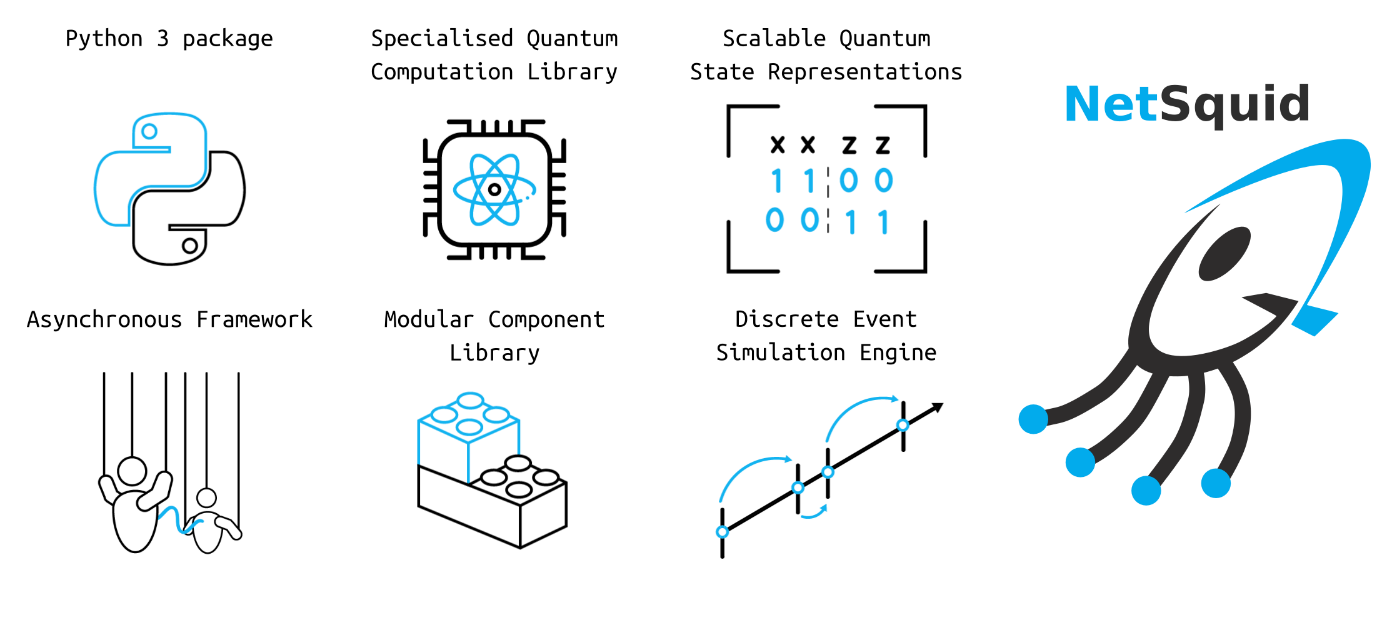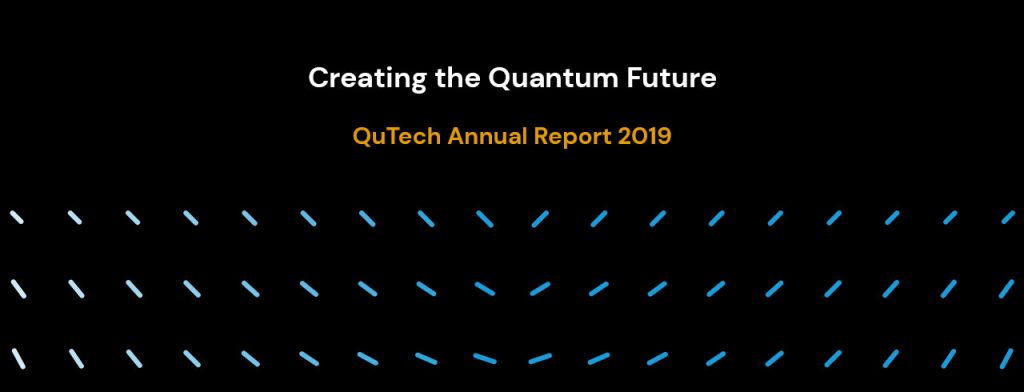30.06.2020Quantum Internet
New software brings quantum network design to users around the world

New software brings quantum network design to users around the world
NetSquid, a specialized simulator for quantum networks has been made freely available for non-commercial users. In development by QuTech since 2017, the software is the first of its kind to model timing effects using discrete events. NetSquid allows researchers around the world to accurately predict the performance of quantum networks and modular quantum computing systems. Such simulations are essential to design scalable quantum systems, and exploit them for radically new types of computation and communication technologies.
Quantum networks
Quantum networks link (small) quantum processors through optical channels. They enable the exchange of quantum bits between any of the connected quantum devices. Future quantum networks can be connected into a quantum Internet in order to perform tasks that are impossible classically, including secure communication, clock synchronization, secure identification, quantum sensor networking, as well as secure access to remote quantum computers in the cloud.
Simulating the effects of time
NetSquid (Network Simulator for Quantum Information using Discrete events) is an easy to use software tool for understanding the effects of time on the performance of quantum network and quantum computing systems. The lifetime of qubits, the quantum equivalents of computer bits, is currently limited. As a first of its kind tool, NetSquid supports designing smart ways to control and program large scale quantum systems in such a way that complex timing dependencies can be mitigated. NetSquid also forms a unique piece of software to determine the requirements of building quantum networks, and modular quantum computing systems. This is an essential step in order to make large scale quantum systems a reality.

Some of the key features of the NetSquid simulation tool package. See the Netsquid website for more information.
Team effort
Developed by an interdisciplinary team at QuTech in Delft, NetSquid was first unveiled to the research community in March 2019. Developer Rob Knegjens: “It means a lot to be able to now share the results of three years of team effort with researchers around the world.” QuTech is a collaboration between Delft University of Technology (TU Delft) and the Netherlands Organisation for Applied Scientific Research (TNO). Researchers at QuTech already used NetSquid to develop the world’s first link layer protocol for a quantum network. NetSquid is also used by the Quantum Internet Alliance EU-funded project of the European Quantum Technologies Flagship to determine the requirements for building a pan-European quantum internet infrastructure.
User community
Prospective users and beta testers are invited to obtain user credentials by first registering at the NetSquid Community Forum. Next, the software can be installed for free. An extensive tutorial is available online. Through the forum, users can interact with other users and with the NetSquid team. Knegjens: “We hope that NetSquid will attract a large and active community of users around it.”
Modularity
PhD students Tim Coopmans and Axel Dahlberg emphasize the modularity of NetSquid, which makes it easy to assemble complex simulations from small building blocks called snippets. Dahlberg: “Snippets are extensions to NetSquid which model specific functionalities, for example to provide a detailed physical model for quantum network nodes running on certain hardware, such as nitrogen-vacancy centers in diamond.” Coopmans adds: “New snippets can be generated through the NetSquid template repository. Much like LEGO bricks, we can combine snippets to easily build large-scale simulations and test different ideas.” Both researchers are looking forward to expanding the team at QuTech with people around the world contributing snippets to NetSquid.
Final release expected for late 2020
After the open ‘beta’ version released now, a final release is anticipated in the second half of 2020. Knegjens: “We strongly encourage users to give us feedback that we can incorporate in the software. Parallel to the beta release we are also running a coding competition with several prizes to stimulate users to contribute their own snippets. We will continue developing and releasing new features as we learn from the community’s needs and use cases.”
***
Note to the editors
Funding
The development of NetSquid was funded by the Dutch government’s Research Cooperation Funds (SMO) and the Dutch Research Council (NWO), as well as by the European Research Council (ERC grant agreement No. 679924). NetSquid has been optimised and extended for its use within the Quantum Internet Alliance (QIA) consortium with funding from the European Union’s Horizon 2020 research and innovation programme (grant agreement No. 820445). QIA is part of the European Quantum Technologies Flagship, a €1billion initiative that aims to consolidate and expand European scientific leadership and excellence in the field of Quantum Technologies and transfer this research from the lab to the market by means of commercial applications and disruptive technologies.
Contact
Rob Knegjens, rob.knegjens[at]tno.nl
